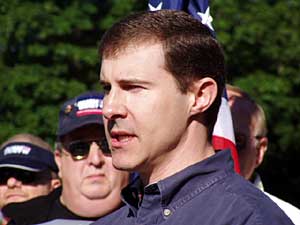Photos
Resources
Your Voice
| ||||||||||||||||||||||||||||||||||||
O'Grady: Kerry's actions after Vietnam constituted treason
August 13, 2004
St. Paul, Minn. — (AP) Scott O'Grady, the Air Force pilot who captured headlines in 1995 when he survived being shot down over Bosnia, on Friday said Sen. John Kerry committed "treason" during the Vietnam War. O'Grady, in an appearance with other military veterans coordinated by President Bush's re-election campaign, said Kerry helped push North Vietnam's proposals for the United States to withdraw at a time when the two countries were still officially at war.
"I see that as treason," said O'Grady, who lives in Texas and has been speaking at veterans events for Bush around the country. He's now retired from the military.
A Bush campaign spokeswoman, Tracey Schmitt, said O'Grady's views were his own.
"The Bush-Cheney campaign does not and has not ever questioned John Kerry's patriotism," Schmitt said.
O'Grady said he was referring to Kerry's 1971 appearance before the Senate Committee on Foreign Relations. In response to a question about how he proposed to end the war, Kerry mentioned that he was involved in peace talks in Paris.
"I have talked with both delegations at the peace talks, that is to say the Democratic Republic of Vietnam and the Provisional Revolutionary Government," Kerry told the panel, according to a transcript.
A U.S. law prohibits citizens from negotiating with foreign governments on matters such as peace treaties.
Earlier this year, Kerry spokesman Michael Meehan told the Boston Globe that Kerry had "no role whatsoever in the Paris peace talks or negotiations." Meehan said Kerry had gone to Paris on a private trip and had one brief meeting with Madam Nguyen Thi Binh and others.
Binh, a leader of the Provisional Revolutionary Government, a communist group based in South Vietnam, had a list of peace-talk points, including the suggestion that U.S. POWs would be released when American forces withdrew.
On Friday, O'Grady asserted that Kerry had championed the proposals of the communist regime in North Vietnam about setting a date to withdraw U.S. troops - a situation O'Grady called "treasonous."
"That is my own, personal opinion," he said.
In his 1971 testimony, Kerry told senators that many officials of the American government had said that prisoners of war would be returned if the United States set a date for withdrawal.
"I think this negates very clearly the argument of the President that we have to maintain a presence in Vietnam, to use as a negotiating block for the return of those prisoners. The setting of a date will accomplish that," Kerry testified.
Kerry's Minnesota campaign, asked for a response to O'Grady, put forward Jim Bootz, a Navy veteran from Chaska who has campaigned for Kerry.
"I don't think there's anything treasonous about what he did," Bootz said.
He said Kerry had been trying to help find a solution for the Vietnam conflict.
"It wasn't a radical viewpoint," Bootz said.
(Copyright 2004 by The Associated Press. All Rights Reserved.) AP-NY-08-13-04 1606EDT
|
News Headlines
|
Related Subjects
|


